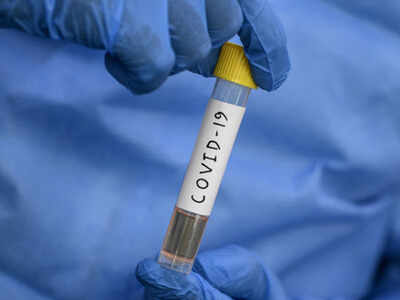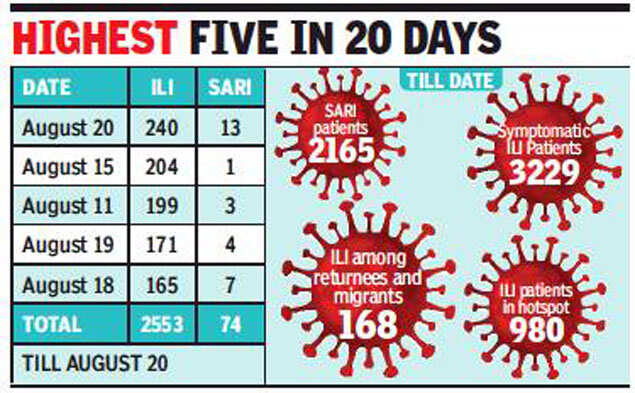
CHANDIGARH: The rise in severe acute respiratory illness (SARI) and influenzalike illness (ILI) cases in the rainy season coupled with people showing complete disregard for preventive measures seems to has accelerated the spread of Covid-19 virus in Punjab.
The alarming rise in the number of cases and deaths has the Punjab government on the back foot. As the state government struggles to break the stranglehold of the virus, people are showing scant regard for adhering to the Covid protocol.

With people not bothering to wear masks and or following social distancing norms, increase in the number of people having SARI and ILI testing positive for Covid-19 has emerged as a key concern for the health experts. As they carry a heavy virus load, such people transmit the virus further at a higher rate than asymptomatic people infected with corona.
According to definition of World Health Organisation (WHO), SARI refers to an acute respiratory infection with a history of fever of 38 C or above and cough with onset in the last seven days and requires overnight hospitalization while ILI refers to acute onset within the last 10 days following respiratory symptoms, measured fever of 38C and above and cough.
From August 1-20, a total of 2,553 people were found to be co-infected with ILI while 74 were having SARI. About 13% of people tested positive out of 20,761 in 20-day duration were having ILI/SARI. During the period, on average over 131 cases of people coinfected with ILI/SARI were reported. Majority of these cases were reported from the worst-hit districts of Ludhiana, Jalandhar, Amritsar, Patiala and Mohali. This has led to increase in occupancy of oxygen and ventilatorequipped beds.
Till date, as many as 2,165 people having SARI and 4,377 having ILI have been tested positive for corona.
High death rate in patients with SARI
High death rate has been observed in Covid-19 patients having SARI and most of them need intensive care unit (ICU) admissions with ventilator support. Deaths have occurred in over 10% of Sari cases in the ongoing month, said Punjab health department spokesperson for Covid-19, Dr Rajesh Bhaskar. “Rise in the number of ILI/SARI cases has contributed to the growth of Covid-19 in the state,” Dr Bhaskar added.
In most of these cases, Covid-19 infected people with SARI/ILI did not have travel history or contact with positive cases, pointing out local transmission of the virus. Aware of the challenge at hand, the health department has increased surveillance. Special teams are conducting door-to-door screening in high priority areas to identify and test with symptoms of SARI/ILI.
Dr KK Talwar, Punjab government’s adviser on health issues, maintained that Covid-19 positive patients with SARI/ILI are a greater risk. Dr Talwar laid stress on early testing and people taking precautions such as wearing masks and maintaining social distance to curb the spread of the virus.
The alarming rise in the number of cases and deaths has the Punjab government on the back foot. As the state government struggles to break the stranglehold of the virus, people are showing scant regard for adhering to the Covid protocol.

With people not bothering to wear masks and or following social distancing norms, increase in the number of people having SARI and ILI testing positive for Covid-19 has emerged as a key concern for the health experts. As they carry a heavy virus load, such people transmit the virus further at a higher rate than asymptomatic people infected with corona.
According to definition of World Health Organisation (WHO), SARI refers to an acute respiratory infection with a history of fever of 38 C or above and cough with onset in the last seven days and requires overnight hospitalization while ILI refers to acute onset within the last 10 days following respiratory symptoms, measured fever of 38C and above and cough.
From August 1-20, a total of 2,553 people were found to be co-infected with ILI while 74 were having SARI. About 13% of people tested positive out of 20,761 in 20-day duration were having ILI/SARI. During the period, on average over 131 cases of people coinfected with ILI/SARI were reported. Majority of these cases were reported from the worst-hit districts of Ludhiana, Jalandhar, Amritsar, Patiala and Mohali. This has led to increase in occupancy of oxygen and ventilatorequipped beds.
Till date, as many as 2,165 people having SARI and 4,377 having ILI have been tested positive for corona.
High death rate in patients with SARI
High death rate has been observed in Covid-19 patients having SARI and most of them need intensive care unit (ICU) admissions with ventilator support. Deaths have occurred in over 10% of Sari cases in the ongoing month, said Punjab health department spokesperson for Covid-19, Dr Rajesh Bhaskar. “Rise in the number of ILI/SARI cases has contributed to the growth of Covid-19 in the state,” Dr Bhaskar added.
In most of these cases, Covid-19 infected people with SARI/ILI did not have travel history or contact with positive cases, pointing out local transmission of the virus. Aware of the challenge at hand, the health department has increased surveillance. Special teams are conducting door-to-door screening in high priority areas to identify and test with symptoms of SARI/ILI.
Dr KK Talwar, Punjab government’s adviser on health issues, maintained that Covid-19 positive patients with SARI/ILI are a greater risk. Dr Talwar laid stress on early testing and people taking precautions such as wearing masks and maintaining social distance to curb the spread of the virus.
Quick Links
Kerala Coronavirus Helpline NumberHaryana Coronavirus Helpline NumberUP Coronavirus Helpline NumberBareilly NewsBhopal NewsCoronavirus in DelhiCoronavirus in HyderabadCoronavirus in IndiaCoronavirus symptomsCoronavirusRajasthan Coronavirus Helpline NumberAditya ThackerayShiv SenaFire in MumbaiAP Coronavirus Helpline NumberArvind KejriwalJammu Kashmir Coronavirus Helpline NumberSrinagar encounter
Get the app








